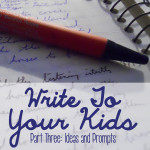
Last week on the blog, I shared my heart in terms of why it’s important to write letters to your children for them to read when they get older. Writing letters helps you leave a lasting legacy to your children and tell them stories that you want to preserve– don’t wait until it’s too late to share these stories. This week, I want to give you some ideas of how to prepare your letters for your children.
A box of memories: Purchase a photo box or other decently sized box. Place letters in there as they’re written, or use tabbed dividers to organize them for specific times for them to be read and shared. The pro of this is that it’s low cost and there’s no need to make sure you have plenty of uniform envelopes and paper before you get started– everything from short-form notes on grocery pads to longer letters on stationary can go in this box to give to your child at a later date (for example, a wedding day or high school graduation).
A journal: Buy a journal or several journals and start writing your letters in the bound notebook. In many ways, this is a great option because you have plenty of space for writing– if you use 15 pages in a setting, that’s okay. Journals are easy to read, almost like a book, and don’t require opening individual letters or notes. If you get a small enough journal, it can be kept in a purse or bag and written in on the go, also.
Digital media: You could store your journals and writing digitally. Whether you write them and scan them in or type them, digital is definitely an option. The pro of digital media, particularly cloud storage, is that if there’s physical damage (a flood, a fire), your information is still there in the cloud, which can help keep those files lasting. However, there’s something less personal about a typed letter (and this is coming from a girl who makes her living on the typed word!). That said, using digital media like burned DVDs, USB drives, and external hard drives may not be the best option becuase, like journals, those can get damaged pretty easily. And don’t rely on sites like Facebook to keep all of your memories, either– who knows if it will be around when you have kids, and even if you do, how many funny Buzzfeed videos will your kids have to sift through to see your status updates that are pertinent to their lives? It’s best to store that content privately in cloud storage. The only caution here is to remember to keep your files backed up, in multiple places including cloud storage, and transferred each time you change your cloud storage. You don’t want to lose these!
Videos: Maybe writing isn’t your strong suit. That’s definitely okay, and often true! You can use video verbal letters to talk to your kids and save that as a lasting legacy. I love the idea of video to pass on to kids– not only do they hear your message, but they’ll never forget your voice. That said, again, media is always changing. I have a whole stack of VHS tapes from my childhood downstairs and no VCR to play them on. You want to make sure that your videos stay updated and stored in the cloud if you choose to go the video route (and yes, you can do private videos on youtube, but if youtube ever removes your videos or youtube disappears someday, you’ll want to have a personal backup!)
Email: A few years ago, Google had an incredible, tear-jerking commercial of a dad who opened an email account for his son and would email pictures, photographs, videos, and more to his son over his childhood. The idea is that this email account would eventually become a dated archive of his life. I love this idea, and who doesn’t have their email available to them 24/7 these days to send a quick email to their child’s account? That said, this only works if you don’t lose the password, and if you’re sure to keep a backup, because again, you never know what might happen to digital systems like email that are constantly changing.
There are so many options for writing to your children, whether you’re leaving handwritten notes, specially bound tomes, videos, or even a personal email account. Whatever you choose, make sure you’re backing it up in some way– scanning in letters, saving cloud stored items to multiple places, keeping records of what you send and save– so you don’t put in all of this work only to lose it in some sort of accident. These are a treasure and you want to protect them as such, otherwise your hard work in putting these stories down was in vain. Next week, I’m going to be talking about some ideas to get you started, and giving writing prompts that will help you motor through your own writing process.
Do you write letters to your children? What format do you use to store them? Let me know in the comments below!




